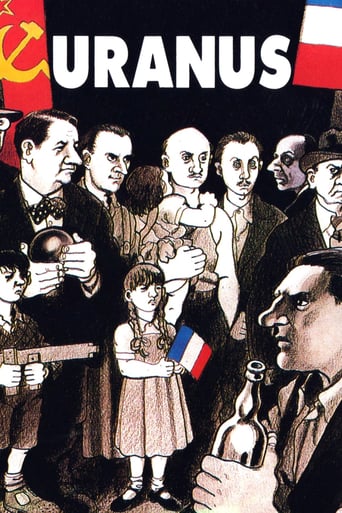Michael Neumann
Claude Berri scratches a few old war wounds in this complex but absorbing drama, set in a small, heavily damaged French town during the period of deprivation and deadly political power struggles following the German occupation. The conflict had united several rivals against a common enemy, but afterward there was influence to be won and scores to be settled, and the question of who resisted and who collaborated would lead to more than one expedient death. It takes a while for the film to introduce all the characters and conflicting loyalties, but once underway it develops considerable steam before the inevitable tragic conclusion. The irony is that the people shown to suffer most are those without any politics at all, like the half-mad, aspiring poet played by Gérard Depardieu, who can chew his way through scenery like no other actor. His unrestrained performance adds an energetic lift to the otherwise thoughtful drama; by contrast, his co-stars in the excellent ensemble cast appear to be sleepwalking.
writers_reign
Claude Berri seldom lets you down whether as Producer, Writer, Actor or Director and if he has a signature when Directing it is in the beautiful compositions he delights in even if dealing with a serious subject as he is here. Although he is no slouch as a writer of Original Screenplays himself some of his finest works have been adaptations of existing material such as Marcel Pagnol's Jean de Florette, Emile Zola's Germinal and this work, based on the novel by Marcel Ayme. It is now a good sixty years since the end of World War II but it remains a sensitive issue to the French for the simple and obvious reason that for several years (1940 - 1944) they were an Occupied nation and that brought out the very Best (Resistance) and very Worst (Collaboration) in the population. Berri's masterstroke is to set his film in the immediate aftermath of the war in a small town still strewn with the rubble of bombing, a backdrop against which the citizens are attempting to resume their lives but in doing so they merely applied a bandage but no dressing to the raw wounds of guilt and retribution allowing them to continue to fester beneath the surface and occasionally erupt into violence and as always it is the essentially gentle giant (Gerard Depardieu), a poetry loving saloon keeper, who pays the highest price. The acting is of the very highest standing throughout with Depardieu, Michel Blanc, Philippe Noiret and Fabrice Luchini beyond praise, as is the film itself if anyone asks you.
Bob Taylor
Claude Berri has given us some fine pictures in the past; this is one of his very best. Aymé's novel had been very cynical, Berri keeps the tone and adds some fiery acting by Depardieu as Leopold the doomed barkeeper to create a lovely film. Hiding a collaborator might have been the focal point of some other film, but here it's almost secondary to the vicious intrigue going on among Communists, Pétain fanciers and others who just want to survive. It's a delight to see Berri showing Rochard, the Communist stalwart who had denounced so many, reporting Leopold to the police as having given shelter to Maxime Loin, then Leopold hires Rochard to help him in the bar: very funny and very pointed satire.The performances are all so good. Michel Galabru as the oily, vicious Monglat, the profiteer whom everyone fears but whom everyone curries favor with is superb. Fabrice Luchini as the doctrinaire Communist Jourdan has hollow cheeks and horrible button eyes; he looks like one of the demented saints in El Greco's paintings. Michel Blanc as Gaigneux, the more realistic Party member, is solid--he not only wants to navigate the swift currents of politics, but is looking for love from Archambaud's daughter.
Gilles Tran
WWII left of lots of scars in French memory. Right after the war, all the French were supposed to have been freedom fighters, minus a few baddies of course. Then, slowly, a different truth started to emerge, and since the controversy has been raging on. Uranus, written by Marcel Aymé right after the war, was always controversial, as is this modern adaptation by Claude Berri. In this half-destroyed (by US bombings) French village in 1945, people try to have their lives back, or to save themselves : communists, drunks, sadistic late-hour partisans, former antisemitic hate-mongers, war profiteers... These characters may be too theoretical to be convincing, and of course the permanent blurring of the line between the good and bad guys is too systematic. However, the superior acting and the fact that the movie still manages to raise difficult issues (the general tone is very misanthropic), make it very compelling.


